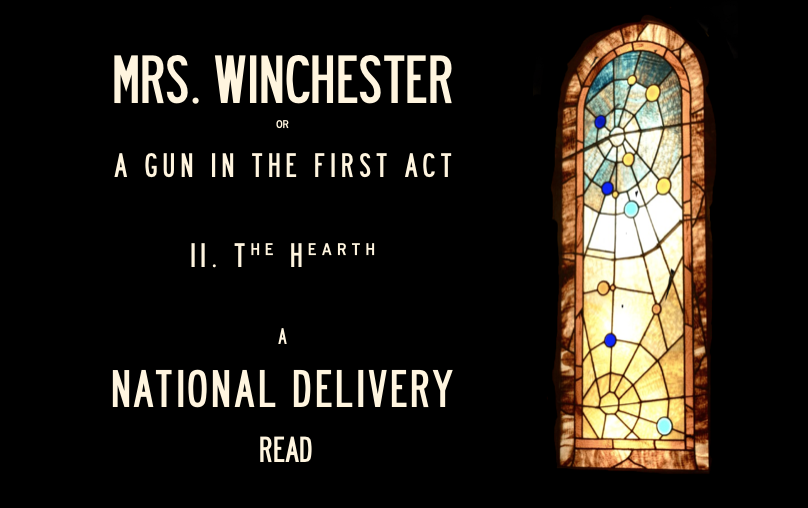Mrs. Winchester II. The Hearth

Mr. Chekhov says, “ A gun in the first act must go off in the third”.
But what if it’s a one-act play?
Or… what if you are in the third act of your life, and the gun - or guns - went off in the first? What then?
There, over the fireplace, is our gun. A Winchester ‘73 - “The gun that won the west”. An example, I think, of perfect design. Look at the detailed engraving, the dogleg cut of the buttstock, the warm cherrywood holding the metal, and that long, lean, imperturbable barrel.
It is a damned thing of beauty.
William would counter, “The beauty is in the action”.
I had long resisted handling our company’s merchandise; the Winchester I held was my husband.
One evening, he interrupted my reading of Pushkin’s Little Tragedies to announce, in dollars, our quarterly profits - a number, I imagined, more familiar to astronomers.
Pushkin, who had died, stupidly, in a duel of pistols, was on my mind, and a tipple or two of port loosed my tongue.
“I wonder the sum in blood”.
His chest sunk. “Sarah,” he sighed. “Come with me”.
Outside, the three of us - William, myself, and an 1866 Winchester shotgun - the first model - stood in a dry field across the road from our property. He set the gun flat in my hands. I held it low.
“How does it feel?”
“Dead”.
He snorted. “You look like The Pietà”.
“How profane”.
He repositioned my hands, one under the barrel, one around the butt, forefinger near, but not on, the trigger, and brought up my elbows. “There; any different?”
“Oh, my yes. What confidence! What agency! For the first time in my poor unprotected life, I feel safe”.
“Enough, darling”.
“Isn’t that what you want to hear?”
He pointed to the broad field. “Look yonder - a rough brute is coming to steal your honor”.
“I only see a sweet brown bunny”.
“It is a drunken sailor hot for maidenhead”.
“He will be very disappointed”.
“Shoot him”.
“I will not!”
“Shoot the beast!”
“No!”
“All right then, at least plug the air and scare it away”.
I glowered at him - the husband, not the rabbit - and cocked the gun. He was impressed that I knew how. I was too.
I aimed above and well to the left of the rabbit. It was nibbling something, and clearly didn’t consider me a threat.
I do not remember pulling the trigger; I do remember the gun going off, and the force of the discharge knocking me back into William.
“Well done, love”!
I looked up and saw that I had not scared the rabbit. I saw shorn and splattered rushes, and a void that had once contained a rabbit.
I dropped the gun in the dirt, turned about, and pounded William’s chest with my fists. He only laughed, and held me as I beat him. Years later, when he died of tuberculosis, I worried that I had primed him for the disease.
“Be rational, Sarah. You eat meat every day, and think nothing of it. Imagine the fine ragu we’ll have tomorrow”!
He was correct. I do eat meat every day and think nothing of it. But I have never forgotten shooting that rabbit.
William was also correct about the ragu; it was fine, though I had to pick a bit of shot out of it. I had been hesitant to eat that night, but considered it my duty to see that the rabbit had not died in vain. I consumed it as penance. Delicious penance.
After supper, William and I retired here to the study, and lit a fire. He opened Thucydides, I switched to Austen. The shared solitude of reading together was a closeness I cherished.
In the middle of a pastoral scene involving lush countryside, a picnic by a swan-skimmed pond, and landed gentry wooing clever young maids… I found myself craving a murder.
I clapped shut my book and got out of the chair. Willam, who had fallen asleep during the Persian War, woke with a start. I paced before the fire, waiting for the right words, then turned to him, if not on him, and put this between us:
“Murder without mortal congress denies a killer their humanity”.
He tilted his head like a dog hearing a sharp noise.
“Could you rephrase that with less poetry”?
“I’ll try”.
I relaxed my shoulders, and exhaled.
“In the good old days… murder was an intimacy. You had to get close. You had to push your dagger through breast and bone as your… intended… flailed, and fought. Blood - blood not your own, blood that you had tapped - trickled thick and tacky onto your hands. If you fancied a throttle, you had to press your fingers into that soft, damp neck, and feel a hysterical pulse. You saw not tears but wet terror. From the gasps came flecks of spittle and a bilious, gamey, very sad waft from supper. The death spasm? A mutual vibration. Then, with the deed done and your bloodlust spent, then came the thing. The real thing. The unbearable thing. Not the body, but the real fruit of murder. A proper killing, a sensual killing, claims all. Murder by hand, unless you are a monster, will usher into you an empathy so profound, nothing of you will remain. That, Mr. Winchester, is murder. Cain and Abel. Anything less is target practice”.
Long pause.
“And?” he asked, in genuine, if anxious, anticipation.
“And that is what I have against guns”.
When people say they married well, it’s usually a measure of the attending purse. Not so with Mr. Winchester, despite his purse. William was never strident in his defense of guns, and rather than contest my opinion, he sat in silence and contemplated it.
Nine months later, our daughter was born.